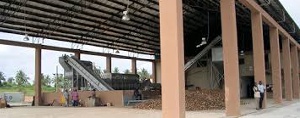Ghana is seeking to leverage on the implementation of the African Continental Free Trade Agreement (AfCFTA) to effect a surge in its export of industrial starch to the global market.
The country, according to the Ghana Export Promotion Authority (GEPA), produces about 16 million metric tonnes of cassava annually of which an estimated 11 million tonnes are available for consumption.
Despite the surplus, GEPA believes the implementation of AfCFTA from January 2021, will facilitate international market access for Ghana’s cassava product exports to markets on the mainland African continent.
GEPA, as part of strategies to increase the Non-Traditional Export revenue of industrial starch, is ready to assist firms to develop measures to enhance the competitiveness of the industrial starch sector through cost reduction and other strategies thereby realizing some decent revenue of US$1 million from 2021 and 2022 and increasing gradually to achieve an overall revenue target of US$14 million by 2029.
The authority is keen to promote investments including FDIs into industrial starch production and provide incentives for companies that venture into local manufacture of industrial starch.
Recent investment initiatives in the industrial starch sector include the provision of credit facility to the tune of US$10.7 million to the Central Sugar Company toward the establishment of a starch manufacturing factory in Prang in the Pru District in the Bono-Ahafo Region.
Other projects being constructed include a US$25 million factory at Nkwanta South in the Volta Region by GMC Universal and a 200 tonne-daily starch output factory at Begoro-Aburaso. Both projects, according to GEPA, are being established in association with Korat SW Group from Thailand.
Both projects are expected to be completed next year.
Meanwhile, the Ayensu Starch Factory which was the first to be established in 2002, has hardly worked efficiently since its setup.
The company has shut down several times in the past for many reasons including raw material deficit, high cost of fuel and managerial issues.
Meanwhile, GEPA maintains that Ghana has a surplus production of cassava, which should be providing a sustainable raw material base for cassava processing factories in the country.
Click to view details



Business News of Wednesday, 18 November 2020
Source: goldstreetbusiness.com

















